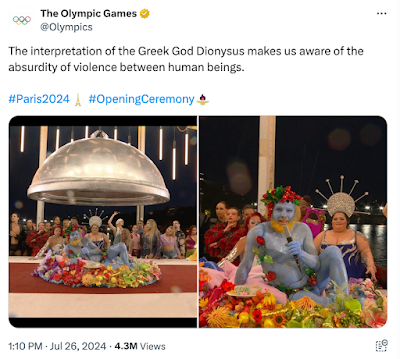“[The Last Supper] is not my inspiration and that should be pretty obvious," production designer Thomas Jolly said, [in translation]. "There’s Dionysus arriving on a table. Why is he there? First and foremost because he is the god of celebration in Greek mythology and the tableau is called ‘Festivity.’”
Those who could only see the Last Supper in the tableau are forgetting or were never taught their history (not to mention their herstory): Dionysus, the Greek god of wine and ecstasy, was by some accounts the son of the grain goddess Demeter of the ancient Eleusinian mysteries. Those mysteries saw yearly pilgrimages of the faithful to experience communion with each other via the sacrament kykeon, thought to be a psychedelic potion.
The Last Supper and the Catholic Mass are likely re-enactments of the Mysteries, with participants munching mushrooms (per Joseph Allegro) and nowadays partaking of communion hosts in which the rye was not permitted to go moldy and psychoactive. Dionysus took the sacred out of the Mysteries when debauchery took hold, with wine containing only alcohol and not the more interesting and holy potions the ancients drank.
"The foundations of the Catholic Church are literally built upon Dionysus," writes Brian Murarescu in his book The Immortality Key. Harkening to The Dionysian Gospel by Dennis McDonald, he relates how Jesus's first miracle as recorded by John, turning water into wine at the Wedding of Cana, equated Jesus with Dionysus as the new God of Ecstasy.
Ancient wines and beers often contained other psychoactive substances. Picking up on scholar Dorothy Irving's interpretation of the Fractio Panis fresco in the Roman Catacomb of Priscilla as depicting female figures breaking bread together ceremonially (shown), Murarescu concludes, "Before Jesus generations of women brewed the graveyard beers and mixed the graveyard wines in the Indo-European ritual that spread east and west of Stone Age Anatolia, the 'ritual act of communion' that was 'by women for women.' After Jesus there were many women who dominated the house churches and catacombs that defined the faith, offering a safe haven for the old Greek sacrament that needed shelter from the wilderness."Once men got hold of the sacraments, war and hedonism took hold over from spiritualism and communion, and humankind has never recovered. The Eleusinian Mysteries were systematically targeted by the Roman senate starting in 186 BC. "The idea of the God of Ecstasy obliterating all loyalty to family and country was not welcome in a Roman Empire in the thick of nation building. Similarly the idea of making visionary wine available to the poor folks and women of the 99 percent was just as offensive to the 1 percent of the religious establishment," Muraresku writes.
In The Power of Myth, Bill Moyers and Joseph Campbell had this exchange:
MOYERS:
Do you ever think that it is this absence of the religious experience
of ecstasy, of joy, this denial of transcendence in our society, that
has turned so many young people to the use of drugs?
CAMPBELL: Absolutely, that is the way in.
MOYERS: The way in?
CAMPBELL: To an experience.
MOYERS: And religion can do that for you, or art can’t do it?
CAMPBELL:
It could, but it is not doing it now. Religions are addressing social
problems and ethics instead of the mystical experience.
Modern
society demonizes what was once a religious experience: the partaking of
psychedelic plants. Communion has now denigrated
into a hollow ceremony performed by a cult, the Catholic church, that has a problem with pedophilia.
And laws against marijuana and other drugs have sent teenagers trying untested
and unregulated substances for the experience they naturally seek. No wonder
they’re confused.
It’s time we came to grips with the fact that
adolescents will forever demand the kind of rite-of-passage experience
that entheogens provide. Instead of offering information and guidance to
our youth, we instead try to shelter them from their own history, and natural inclinations, to their own detriment and that of society.


1 comment:
Great writing. Thank you for this perspective! The Woodnymph enjoyed this article!
Post a Comment